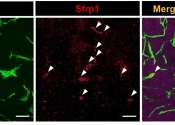Proteogenomics analysis of high-grade gliomas offers hints on tumor evolution
In August 2023, a team of researchers including Dr. Eduard Porta, group leader at the Josep Carreras Institute, published a thorough analysis of the effects of cancer driver alterations found across different cancer types, ...
20 hours ago
0
0









